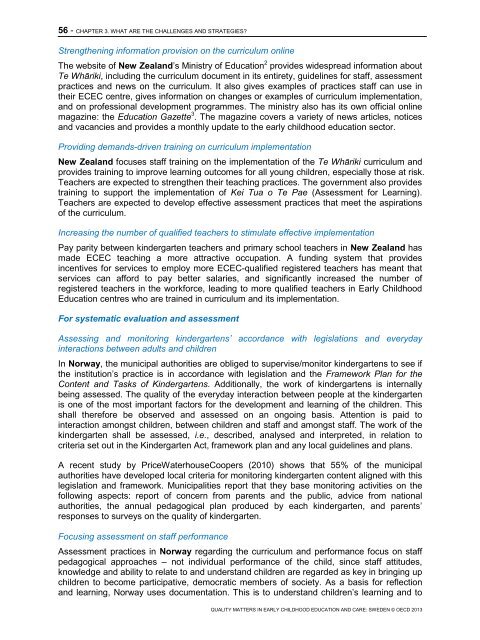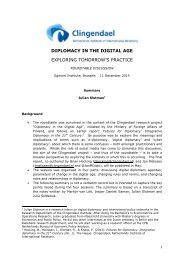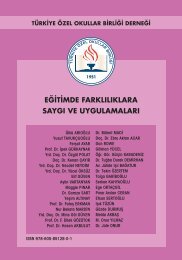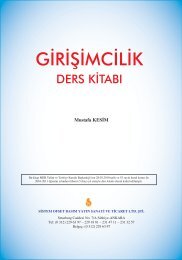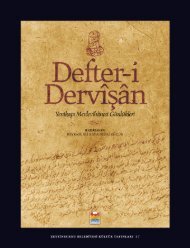SWEDEN%20policy%20profile%20-%20published%2005-02-2013
SWEDEN%20policy%20profile%20-%20published%2005-02-2013
SWEDEN%20policy%20profile%20-%20published%2005-02-2013
You also want an ePaper? Increase the reach of your titles
YUMPU automatically turns print PDFs into web optimized ePapers that Google loves.
56 - CHAPTER 3. WHAT ARE THE CHALLENGES AND STRATEGIES?<br />
Strengthening information provision on the curriculum online<br />
The website of New Zealand’s Ministry of Education 2 provides widespread information about<br />
Te Whāriki, including the curriculum document in its entirety, guidelines for staff, assessment<br />
practices and news on the curriculum. It also gives examples of practices staff can use in<br />
their ECEC centre, gives information on changes or examples of curriculum implementation,<br />
and on professional development programmes. The ministry also has its own official online<br />
magazine: the Education Gazette 3 . The magazine covers a variety of news articles, notices<br />
and vacancies and provides a monthly update to the early childhood education sector.<br />
Providing demands-driven training on curriculum implementation<br />
New Zealand focuses staff training on the implementation of the Te Whāriki curriculum and<br />
provides training to improve learning outcomes for all young children, especially those at risk.<br />
Teachers are expected to strengthen their teaching practices. The government also provides<br />
training to support the implementation of Kei Tua o Te Pae (Assessment for Learning).<br />
Teachers are expected to develop effective assessment practices that meet the aspirations<br />
of the curriculum.<br />
Increasing the number of qualified teachers to stimulate effective implementation<br />
Pay parity between kindergarten teachers and primary school teachers in New Zealand has<br />
made ECEC teaching a more attractive occupation. A funding system that provides<br />
incentives for services to employ more ECEC-qualified registered teachers has meant that<br />
services can afford to pay better salaries, and significantly increased the number of<br />
registered teachers in the workforce, leading to more qualified teachers in Early Childhood<br />
Education centres who are trained in curriculum and its implementation.<br />
For systematic evaluation and assessment<br />
Assessing and monitoring kindergartens’ accordance with legislations and everyday<br />
interactions between adults and children<br />
In Norway, the municipal authorities are obliged to supervise/monitor kindergartens to see if<br />
the institution’s practice is in accordance with legislation and the Framework Plan for the<br />
Content and Tasks of Kindergartens. Additionally, the work of kindergartens is internally<br />
being assessed. The quality of the everyday interaction between people at the kindergarten<br />
is one of the most important factors for the development and learning of the children. This<br />
shall therefore be observed and assessed on an ongoing basis. Attention is paid to<br />
interaction amongst children, between children and staff and amongst staff. The work of the<br />
kindergarten shall be assessed, i.e., described, analysed and interpreted, in relation to<br />
criteria set out in the Kindergarten Act, framework plan and any local guidelines and plans.<br />
A recent study by PriceWaterhouseCoopers (2010) shows that 55% of the municipal<br />
authorities have developed local criteria for monitoring kindergarten content aligned with this<br />
legislation and framework. Municipalities report that they base monitoring activities on the<br />
following aspects: report of concern from parents and the public, advice from national<br />
authorities, the annual pedagogical plan produced by each kindergarten, and parents’<br />
responses to surveys on the quality of kindergarten.<br />
Focusing assessment on staff performance<br />
Assessment practices in Norway regarding the curriculum and performance focus on staff<br />
pedagogical approaches – not individual performance of the child, since staff attitudes,<br />
knowledge and ability to relate to and understand children are regarded as key in bringing up<br />
children to become participative, democratic members of society. As a basis for reflection<br />
and learning, Norway uses documentation. This is to understand children’s learning and to<br />
QUALITY MATTERS IN EARLY CHILDHOOD EDUCATION AND CARE: SWEDEN © OECD <strong>2013</strong>


